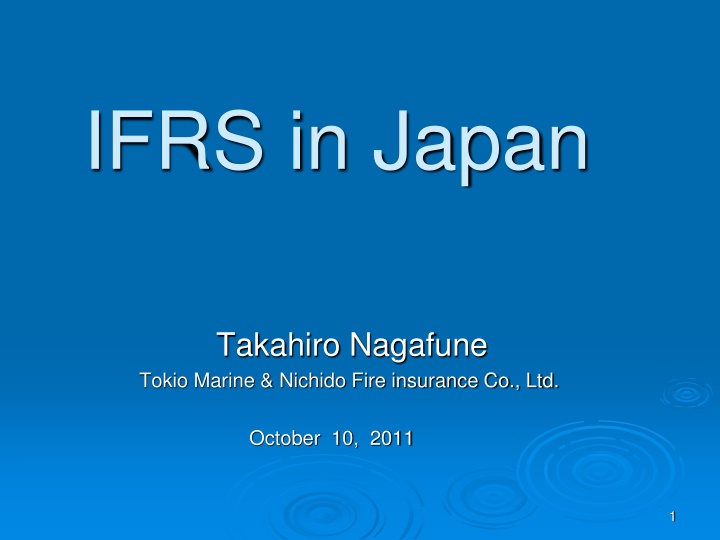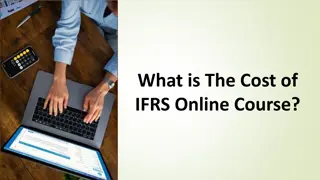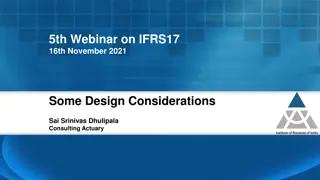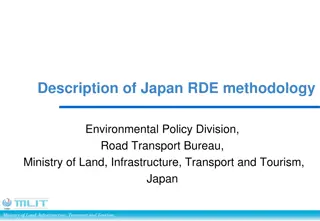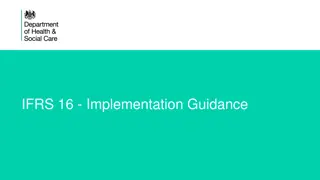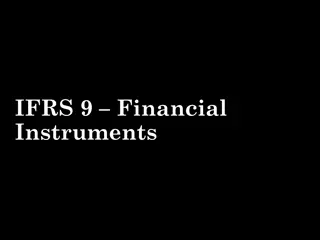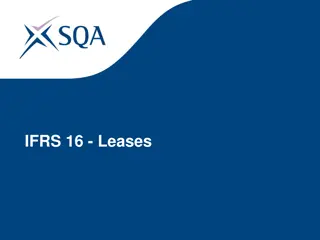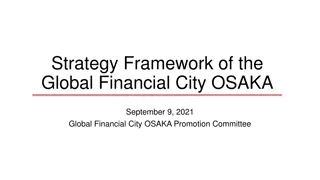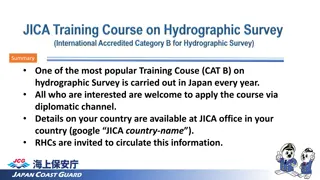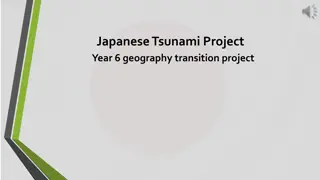Overview of IFRS Implementation in Japan
The overview of IFRS implementation in Japan includes the voluntary and mandatory phases, benefits for companies, challenges faced during implementation, and future plans for mandatory adoption. The process involves transitioning from Japanese standards to IFRS, with a focus on reducing funding costs, improving efficiency, and enhancing competitiveness. Companies are preparing for the mandatory implementation, which is set to begin in 2015 at the earliest, with considerations for preparation time and potential dual standards. Financial institutions and listed companies are key players in this transition.
Download Presentation

Please find below an Image/Link to download the presentation.
The content on the website is provided AS IS for your information and personal use only. It may not be sold, licensed, or shared on other websites without obtaining consent from the author.If you encounter any issues during the download, it is possible that the publisher has removed the file from their server.
You are allowed to download the files provided on this website for personal or commercial use, subject to the condition that they are used lawfully. All files are the property of their respective owners.
The content on the website is provided AS IS for your information and personal use only. It may not be sold, licensed, or shared on other websites without obtaining consent from the author.
E N D
Presentation Transcript
IFRS in Japan Takahiro Nagafune Tokio Marine & Nichido Fire insurance Co., Ltd. October 10, 2011 1
IFRS in Japan 1. Introduction 2. Implementation 3. Future 4. Insurance 2
IFRS in Japan 1. Introduction An interim Report by Financial Services Agency (FSA) (June, 2009) - Voluntary implementation of IFRS - Mandatory implementation of IFRS 3
IFRS in Japan 1. Introduction An interim Report by FSA (June, 2009) 1) Voluntary Implementation - Date: Starting from March, 2010 - Entities: Listed Companies - Consolidated Financial Report Only Japanese Standards are applied to; - Single Report - Taxation 4
IFRS in Japan 1. Introduction An interim Report by FSA (June, 2009) 2) Mandatory Implementation - Final decision is to be made in 2012 - Consolidated reports of all listed companies - At one time or gradually - At least three years for preparation - Starting from 2015 at the earliest 5
IFRS in Japan 2. Implementation 1) Benefits for a company - Reduction of funding cost - Improvement of efficiency - Improvement of competitiveness 6
IFRS in Japan 2. Implementation 2) Number - A company (as of March, 2010) - Three companies (as of March, 2011) - None of financial institutions - Among 3,600 listed companies 7
IFRS in Japan 2. Implementation 3) Difficulties Companies are concerned about; - a lot of time and cost to prepare for the implementation - double standards after the implementation - IFRS for a consolidated report - JFRS for single / taxation reports Some companies will continue to use U.S. standards, which are irregularly permitted by FSA. 8
IFRS in Japan 3. Future 1) Mandatory Implementation (in the interim report as of June, 2009) - Final decision is to be made in 2012 - At least three years for preparation - Starting from 2015 at the earliest 9
IFRS in Japan 3. Future 2) Mandatory Implementation (comments by Minister of FSA as of June, 2011) - Mandatory Implementation will start in or after 2016 - At least five years for preparation 10
IFRS in Japan 4. Insurance 1) IFRS for "Insurance Contracts" (IFRS 4) - Various comments for the exposure draft are under consideration - A revised exposure draft will be released in 2012 11
IFRS in Japan 4. Insurance 2) Other Issues Concerned Other issues concerned with IFRS are; - Supervisory Solvency Assessment - ERM Consistency between the frameworks 12
IFRS in Japan 4. Insurance 3) A company's preparation for IFRS - Building databases - Developing calculation systems 13
IFRS in Japan 4. Insurance 3) A company's preparation for IFRS 2008 2009 2010 2011 2012 2013 Stock databases Final Flow databases Calculation systems revision 14
IFRS in Japan 4. Insurance 4) Actuaries 16th EAAC "Venture into Uncertainty" "Capture Opportunities" Each actuary will have to handle various issues on; - IFRS - Supervisory Solvency Assessment - ERM 15
IFRS in Japan Thank you. 16
